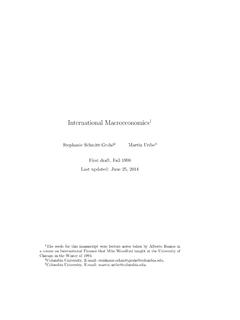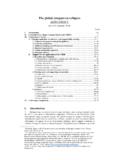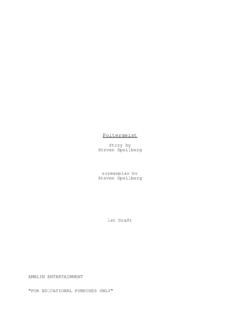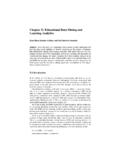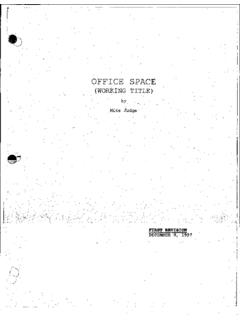Transcription of BEPS ACTION 7: PREVENTING THE ARTIFICIAL ... - …
1 Public Discussion draft BEPS ACTION 7: PREVENTING THE ARTIFICIAL AVOIDANCE OF PE STATUS 31 October 2014 9 January 2015 3 TABLE OF CONTENTS A. ARTIFICIAL avoidance of PE status through commissionnaire arrangements and similar strategies ..10 B. ARTIFICIAL avoidance of PE status through the specific activity 1. The exceptions are not restricted to preparatory or auxiliary activities ..15 2. The word delivery in subparagraphs a) and b) of paragraph 4 ..16 3. The exception for purchasing offices ..17 4.
2 Fragmentation of activities between related parties ..19 C. Splitting-up of contracts ..21 D. Insurance ..23 E. Profit attribution to PEs and interaction with ACTION points on transfer 4 PROPOSED DISCUSSION draft : PREVENTING THE ARTIFICIAL AVOIDANCE OF PE STATUS 31 October 2014 WORK ON ACTION 7 OF THE BEPS ACTION PLAN (PREVENT THE ARTIFICIAL AVOIDANCE OF THE PE STATUS) The OECD ACTION Plan on Base Erosion and Profit Shifting,1 published in July 2013, identifies 15 actions to address BEPS in a comprehensive manner and sets deadlines to implement these actions.
3 The ACTION Plan stresses the need to update the treaty definition of permanent establishment (PE) in order to prevent abuses of that threshold. It notes that the interpretation of the treaty rules on agency-PE allows contracts for the sale of goods belonging to a foreign enterprise to be negotiated and concluded in a country by the sales force of a local subsidiary of that foreign enterprise without the profits from these sales being taxable to the same extent as they would be if the sales were made by a distributor, which has led enterprises to replace arrangements under which the local subsidiary traditionally acted as a distributor by commissionnaire arrangements with a resulting shift of profits out of the country where the sales take place without a substantive change in the functions performed in that country.
4 The ACTION Plan also notes that multinationals may artificially fragment their operations among multiple group entities to qualify for the exceptions to PE status for preparatory and auxiliary activities. ACTION 7 of the ACTION Plan indicates the need to address these issues: ACTION 7 Prevent the ARTIFICIAL Avoidance of PE Status Develop changes to the definition of PE to prevent the ARTIFICIAL avoidance of PE status in relation to BEPS, including through the use of commissionnaire arrangements and the specific activity exemptions.
5 Work on these issues will also address related profit attribution issues. Further, the Report Addressing the Tax Challenges of the Digital Economy has identified issues in the digital economy that need to be taken into account in the course of the work on ACTION 7, namely ensuring that core activities cannot inappropriately benefit from the exception from permanent establishment (PE) status and that ARTIFICIAL arrangements relating to sales of goods and services cannot be used to avoid PE status. 1. Available at: 5 As part of the transparent and inclusive consultation process mandated by the ACTION Plan, the Committee on Fiscal Affairs (CFA) invites interested parties to send comments on this discussion draft , which includes the preliminary results of the work carried on with respect to issues related to the ARTIFICIAL avoidance of PE status and includes proposals for changes to the definition of permanent establishment found in the OECD Model Tax Convention.
6 The views and proposals included in this discussion draft do not represent the consensus views of the CFA or its subsidiary bodies but are intended to provide stakeholders with substantive proposals for analysis and comment. Comments should be sent by 9 January 2015 at the latest (no extension will be granted) and should be sent by email to in Word format (in order to facilitate their distribution to government officials). They should be addressed to Marlies de Ruiter, Head, Tax Treaties, Transfer Pricing and Financial Transactions Division, OECD/CTPA Please note that all comments received regarding this consultation draft will be made publicly available.
7 Comments submitted in the name of a collective grouping or coalition , or by any person submitting comments on behalf of another person or group of persons, should identify all enterprises or individuals who are members of that collective, or the person(s) on whose behalf the commentator(s) are acting. Public consultation meeting Persons and organisations who will send comments on this consultation document are invited to indicate whether they wish to speak in support of their comments at a public consultation meeting on ACTION 7 that is scheduled to be held in Paris at the OECD Conference Centre on 21 January 2015.
8 Persons selected as speakers will be informed by email by 16 January at the latest. This consultation meeting will be open to the public and the press. Due to space limitations, priority will be given to persons and organisations who register first (we reserve the right to limit the number of participants from the same organisations). Persons wishing to attend this public consultation meeting will be able to register on line. On line registration for the meeting will be available from 15 November 2014 to 9 January 2015. Registrations will not be accepted before and after that period.
9 Confirmation of participation, including venue access details, will be sent by email to participants by 16 January at the latest. This meeting will also be broadcast live on the internet and can be accessed on line. No advance registration will be required for this internet access. Other Languages French and Spanish translations of this document will be available shortly. When complete, links to these versions will be made available here. 6 EXECUTIVE SUMMARY ACTION 7 of the BEPS ACTION Plan calls for the development of changes to the definition of PE to prevent the ARTIFICIAL avoidance of PE status in relation to BEPS, including through the use of commissionnaire arrangements and the specific activity exemptions.
10 The Focus Group on the ARTIFICIAL Avoidance of PE Status, which was set up in order to carry out the work on ACTION 7, discussed various aspects of the permanent establishment definition that could give rise to BEPS concerns and identified a number of strategies resulting in the ARTIFICIAL avoidance of PE status. It then examined a number of options for changes to Article 5 that would address these strategies. In doing so, the Group benefitted from the analysis contained in the report Addressing the Tax Challenges of the Digital Economy, which recommends that the work on ACTION 7 consider whether certain activities that were previously considered to be preparatory or auxiliary may be increasingly significant components of businesses in the digital economy.










